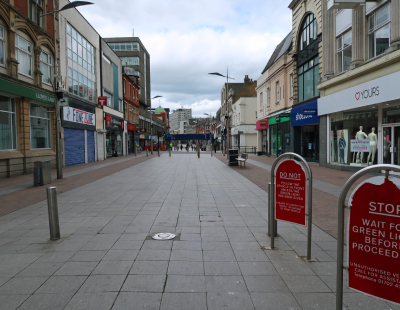Commercial to resi has become a major trend - but is it only temporary?
Converting commercial property to residential property has always been a popular option for developers. Many commercial properties are conveniently located and occupy larger plots than existing residential plots.
Add to this the car parks for existing retail, restaurants, pubs and other commercial units and this makes a change of use a financially attractive proposition for many developers.
How is commercial property faring now compared to the worst days of the pandemic?
Commercial property has fared better than most agents felt it would suffer throughout the pandemic. Business rate holidays and reductions together with the relaxation of rent costs have helped many operators.
Existing owners have seen a reduction in income from lower rent, but this has been the same for all landlords. Property has continued to move, if at a slower rate of sale, but tenancy options have tended to be stagnant.
Even this trend has been challenged with many smaller properties being attractive to those people who have looked for a change of direction post-pandemic and started their own business.
Are more commercial to resi conversions inevitable as offices continue to operate at lower or no capacity, and some parts of the high street continue to suffer?
Nothing is inevitable, and less so with development and change of use. The recent amendments to the planning act introduced by the government have not been attractive, and after the recent reshuffle are now on hold.
Landlords are appearing to wish to keep existing tenants, even if this means lower rents, rather than test the market by putting properties on the market hoping for quick wins by selling to hungry developers.
Many offices are not located in sites attractive to residential occupation (out of town office 'parks', etc). There is definitely the possibility for change of use, and maybe this could even be to warehouse storage as e-commerce increases. We are not yet seeing a rush to this, though.
City centre high streets are definitely suffering. Big names are abandoning the large city-centre sites, but agents are advising that market towns and many suburban high streets are flourishing with very little vacant property.
Change of use can take a considerable amount of time to confirm with planners. This means that money is tied up for developers unless they have a clear timescale for the development.
Are mixed-used schemes, combining commercial and residential in the same development or project, a better compromise than just straight-up commercial to resi conversions?
This is a solution that would energise many town and city centre streets that have high pension fund ownership. Currently, these pension funds invest in commercial only, making the upper floors of retail units in many established high streets unlettable for residential use.
A change to this would mean more inner-city/town living and solve issues relating to housing and bring life to areas after dark.
What are some of the challenges associated with repurposing commercial properties?
Many commercial properties require a complete refurbishment which is costly. For many, it is cheaper to knock down the property and rebuild. This means high development costs and lower profit for developers. Such developments are then unattractive.
Added to this, many local communities do not want to see the loss of facilities. Pubs, cinemas, and shops have all seen recent opposition to change of use based upon the loss of the facility.
The bottom line for any developer wishing to change the use of a property is that the change makes better economic use of the property or plot. With added costs, for whatever reason, this makes each proposed development a finely balanced decision.
Steve Jacob, CEO of Fabrik Invest
How easy is it to convert commercial premises into residential?
The ease of converting commercial premises really depends on the commercial property. B1 office to residential is a regular use class change, but listed buildings are tough to convert, as are those in conservation areas, as you need certain sign offs.
That said, it can still be much quicker to get hold of a commercial building and convert it to residential accommodation than to build from scratch. If the layout is simple, then you can send in a fit-out team to put stud walls and electrics in, which can be a lot quicker and a lot more cost-effective.
I’ve done a lot of commercial to residential conversions. I like getting buildings subject to planning and then sometimes flipping the building and sometimes developing the building out. There’s always a lot of potential.
What are the rewards and potential risks?
You can buy some really great assets when you look at commercial properties. For example, I recently bought a bank that I'm going to do up and turn into three apartments. It’s a superb building in a great location – banks tend to be built really well.
The reward for me there is that I've got a bit of a trophy asset in a good town, with excellent potential. The risk is that it’s in a conservation area, so planning was slow, which meant I had to sit and watch development costs increase while I waited.
The potential risk of development is always construction. Construction is risky. You need to find a good contractor and to limit any potential for issues to arise during the construction phase.
The main reward is, of course, the financial gain that you can make on the property.
Is converting existing stock more sustainable and eco-friendly than building new homes?
With a new build, you can ensure that all of your materials and your whole supply chain is eco-friendly, as well as the build process, so that’s probably the more sustainable option.
That said, there’s a huge amount you can do with conversions to make them more eco-friendly. You can have solar panels, powerwalls, biomass boilers…there are lots of ways in which you can make a conversion eco-friendly.
Are there certain commercial premises that are easier to convert than others - for example offices being easier than a former restaurant or bank?
Certain commercial premises are easier to convert than others. It largely comes down to the shape of the building. You don't want too many jagged corners or a building in the shape of a hexagon or an octagon! The squarer a building is, the better. A building that’s a funny shape can be a real pain.
Much also depends on where the stairwells are in the property. If you can utilise an existing staircase or a lift shaft, that can save you a lot of money.
As a developer, the more symmetrical the development is, the lower the cost. If you can use a cookie-cutter template for your apartments, it’s going to cost less than having to deal with different size kitchens, different shape bathrooms and so forth. The more symmetrical the property, the more value you can squeeze out of it and the more you can save on tradespeople’s time.
This trend has exploded since Covid, but is enough support being provided to make it a long-term viable strategy for developers and investors?
I think there’s enough support. The government is trying to make it easier to convert properties, although planning is extremely painful! I think if they stop printing money, it will make it a lot more of a long-term viable strategy, because it will slow down inflation. They need to taper quantitative easing, but then will that create a correction within the market?
The thing that’s killing developers at the moment is the constant rise of construction prices. Developers have got to really fight to get these projects through and it’s very hard when your construction prices keep going up.
Construction companies keep changing their pricing. Inflation is going to be the biggest killer for developers over the coming years, I would imagine.
What else should developers/investors know?
If you’re doing any kind of commercial to residential conversion, always obtain a ‘subject to planning’ contract. It protects you. I don’t buy things that are unconditional. The only time I’ve ever done that, it’s been frustrating and stressful.
I’m a great believer in the commercial to residential strategy. I’ve got plenty of those kinds of deals in the pipeline and now we’re working alongside institutions and funds it’s even more fun than it used to be. Long live commercial to resi conversions!
*Part 2, outlining the main advantages of commercial to resi conversions, will appear on Monday


















Join the conversation
Be the first to comment (please use the comment box below)
Please login to comment